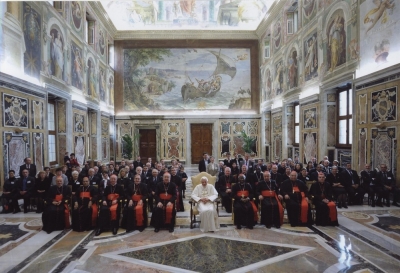In the exercise of his task at the service of the Church throughout the world, the Pope is assisted by a series of bodies brought together under the name of Roman Curia. The Curia is not to be confused with the government of a State. The Pope is, indeed, also a Head of State, the Head of the smallest State in the world, the Vatican City; but the only reason for the existence of this tiny State is to guarantee the freedom the Pope needs for the exercise of his function as Supreme Pastor of the Catholic Church. It is in this specific function that he is assisted by the Roman Curia. The Curia is made up of different dicasteries which take care of different aspects of the life of the Church and of her relations with the realities of the world.
The Pontifical Council for the Laity is, in particular, the dicastery that assists the Pope in all matters concerning the contribution the lay faithful make to the life and mission of the Church, whether as individuals or through the various forms of association that have arisen and constantly arise within the Church.
The origin of the Pontifical Council for the Laity goes back to a proposal formulated in the Decree on the Lay Apostolate of the Second Vatican Council (cfr. Apostolicam Actuositatem, n. 26). It was officially created by Paul VI on 6 January 1967 with the motu proprio Catholicam Christi Ecclesiam. Ten years later, on 10 December 1976, with another motu proprio, Apostolatus Peragendi, Paul VI reformed the Council, including it among the permanent dicasteries of the Roman Curia. Having grown «in experience and maturity» and given «clear signs of faithful service and of the importance of its tasks for the life of the Church and the ministry of the Pope», it has been constantly encouraged by John Paul II—who, as Archbishop of Krakow, was for years one of its Consultors —and has been confirmed in the exercise of its specific responsibilities. Its structure and its competence were defined essentially by the Apostolic Constitution Pastor Bonus of 28 June 1988, the document with which John Paul II traced the new outlines of the Roman Curia. The Constitution states that «the Pontifical Council for the Laity is competent in those matters pertaining to the Apostolic See in promoting and coordinating the apostolate of the laity and, generally, in those matters respecting the Christian life of lay people as such» (art. 131); it is «to urge and support lay people to participate in the life and mission of the Church in their own way, as individuals or in associations, especially so that they may carry out their special responsibility of filling the realm of temporal things with the spirit of the Gospel» (art. 133); it «fosters joint action among lay people in catechetical instruction, in liturgical and sacramental life as well as in works of mercy, charity and social development»; and «it attends to and organizes international conferences and other projects concerning the apostolate of the laity» (ibid.). Finally, the Constitution Pastor Bonus states that «within the parameters of its own competence, the Council performs all activities respecting lay associations of the Christian faithful; it erects associations of an international character and provides approval or recognition for their statutes, saving the competence of the Secretariat of State. As for secular third orders, the Council deals only with those matters concerning their apostolic activities» (art. 134).
The Pontifical Council for the Laity is guided by a President, assisted by a Secretary. The President is at this time His Eminence Card. Stanisław Ryłko (Poland). The Secretary is the German Bishop Msgr. Josef Clemens. Under-Secretary is Msgr. Miguel Delgado Galindo, from Spain.
A Presidential Committee, composed of Cardinals and Bishops, meets periodically to discuss questions of major importance. The Members of the Council are Bishops, priests and, especially, lay people, men and women, from all parts of the world, who meet in Plenary Assembly to deal with matters which seem at the time of greater urgency for the life and mission of the laity. With the Council also cooperate Consultors, who are convoked for working sessions or consulted individually on specific matters.


